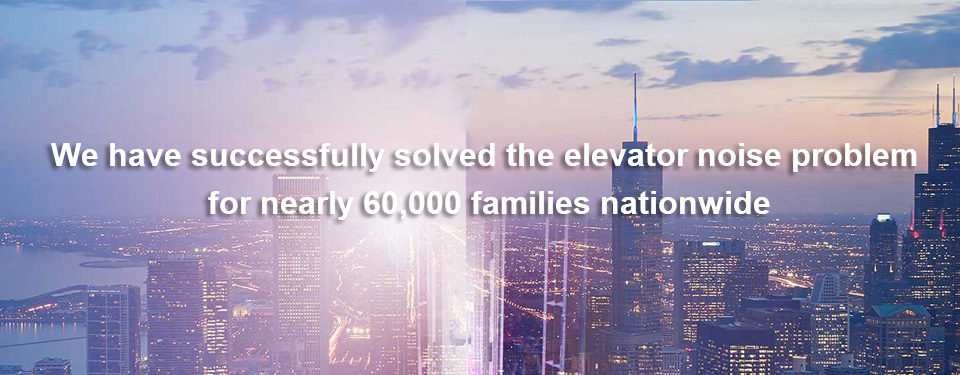Mr. and Mrs. Zhang are 5-story residents of a commercial house. The noise emission of the adjacent elevator exceeds the standard, which seriously affects the normal life of the family. Mr. Zhang and his wife sued the real estate developers for the infringement of noise pollution.
Recently, the first intermediate people's Court of Beijing finally adjudicated the case. The developer immediately took sound insulation measures until the noise emission reached the national standard. Mr. Zhang and his wife were compensated 3500 yuan for the test fee.
Mr. Zhang and his wife claimed in the lawsuit that the commercial housing they purchased includes three bedrooms: master bedroom, guest bedroom and children's room. When they first checked in in September 2005, the two bedrooms were the master bedroom and the children's room. Soon the children complained that they couldn't sleep because of the noise from the elevator. Mr. and Mrs. Zhang asked the developers and the property management to control the noise from the elevator. After inspection, the property Engineering Department replied that the elevator operation will inevitably produce noise, and there is no legal person for adjustment. In desperation, Mr. Zhang had to arrange for his children to stay in the master bedroom and his wife to stay in the guest bedroom. After that, for more than a year, because the guest bedroom can obviously feel the elevator noise, the couple often are disturbed by the elevator noise at night and in the early morning. Mr. Zhang's wife suffered from severe neurasthenia due to long-term lack of sleep. She often felt dizzy and had no good way to go to the hospital. Therefore, she was forced to move to the master bedroom to live with her children. Mr. Zhang himself often feels tired and sleepy due to the noise interference of the elevator, and his work efficiency is low. During the physical examination, he found out that he was in a sub-health state.
In February 2009, Mr. Zhang entrusted Tsinghua University building environment testing center to measure the impact of elevator operation on indoor noise. The results showed that the indoor noise of children's room and guest bedroom was 35.4db (a) and 31.8db (a), respectively, when the elevator was running at night (after 22 o'clock), which exceeded the national room for class 1 environmental functional area at night (civil residence belongs to class 1) fixed equipment due to structural transmission The internal noise limit is 30dB (a), and it also exceeds the national emission limit standard within the range of octave band 250Hz and 500Hz sound pressure level. Therefore, the noise emission of the unit elevator of Mr. and Mrs. Zhang does not conform to the national standard (GB12348-2008). Therefore, Mr. and Mrs. Zhang sued the court and asked the developer to take sound insulation measures for the elevator until the noise emission reached the national standard, compensated 150000 yuan of housing impairment loss caused by noise, paid 120000 yuan of mental damage relief, and undertook 3500 yuan of inspection fee paid by Mr. Zhang.
The court held that the developer has an unshirkable responsibility for residential design, elevator purchase and configuration in the community. The test report data submitted by Mr. Zhang and his wife is accurate, true and effective, which proves that the elevator does have the problem of noise emission exceeding the standard at this stage, and seriously affects the normal life of Mr. Zhang and his wife. Elevator noise pollution will cause damage to people's physical and mental health. Now Mr. and Mrs. Zhang request the developers to take sound insulation measures. According to the law, the court will support them. However, the elevator noise pollution did not cause serious damage to Mr. Zhang and his wife. The court did not support his claim for compensation for mental damage. In addition, Mr. and Mrs. Zhang's housing prices have not been reduced, and the devaluation fee of 150000 yuan has no legal basis. As for the report on elevator noise problem submitted by the developer, because the measurement time is after the acceptance of this case, it has no effect on the certification effect of the test report submitted by Mr. and Mr. Zhang's wife, and the developer can not prove that the elevator noise emission meets the standard of class 1 acoustic environment functional area at night, the court will not accept the defense reason.
Accordingly, the court rendered the above judgment.
Litigants said
Mr. Zhang believes that the responsibility for the current elevator noise infringement lies entirely with the commercial housing developers. According to the relevant national housing design codes, elevators should not be set next to bedrooms, while developers set elevators in the position next to children's rooms, and did not take necessary noise reduction and shock absorption measures. At the same time, the elevator control cabinet installed by the developer is not set in the closed space, but directly exposed outside, which aggravates the noise pollution. Mr. Zhang believes that the main reasons for the excessive noise of the elevator are the design defects of the developers in the construction process, the cutting of materials and the omission of the noise control of the elevator, which has obvious faults for the occurrence and expansion of the damage results.
The developer argued that our company is not the owner of the elevator, nor the manufacturer and manager of the elevator, so it is not a qualified defendant in this case. The elevator passed the completion acceptance, indicating that the quality of the elevator was qualified at the time of delivery. At the same time, according to the report on elevator noise issued by Beijing JinFang equipment installation Co., Ltd., the noise emission of the elevator was tested to meet the national standard. As for the data obtained from Mr. and Mrs. Zhang's unilateral entrustment to carry out the test, our company does not think that the single entrustment is fair and legal. Moreover, since the test is only the noise situation on February 21, 2009, it cannot prove the starting point and continuity of noise pollution. At the same time, Mr. and Mrs. Zhang's indoor noise sources are multi-directional. There is no legal and factual basis for them to attribute the noise pollution to the elevator noise. In addition, the house devaluation loss claimed by Mr. Zhang and his wife of 150000 yuan did not actually occur, but the house has greatly increased compared with the purchase.
News depth
Where does the elevator noise come from
With the rapid development of real estate in China, elevator has become an indispensable tool in people's life. Elevator noise is also very common in the real estate disputes. In the house has become the most family

















